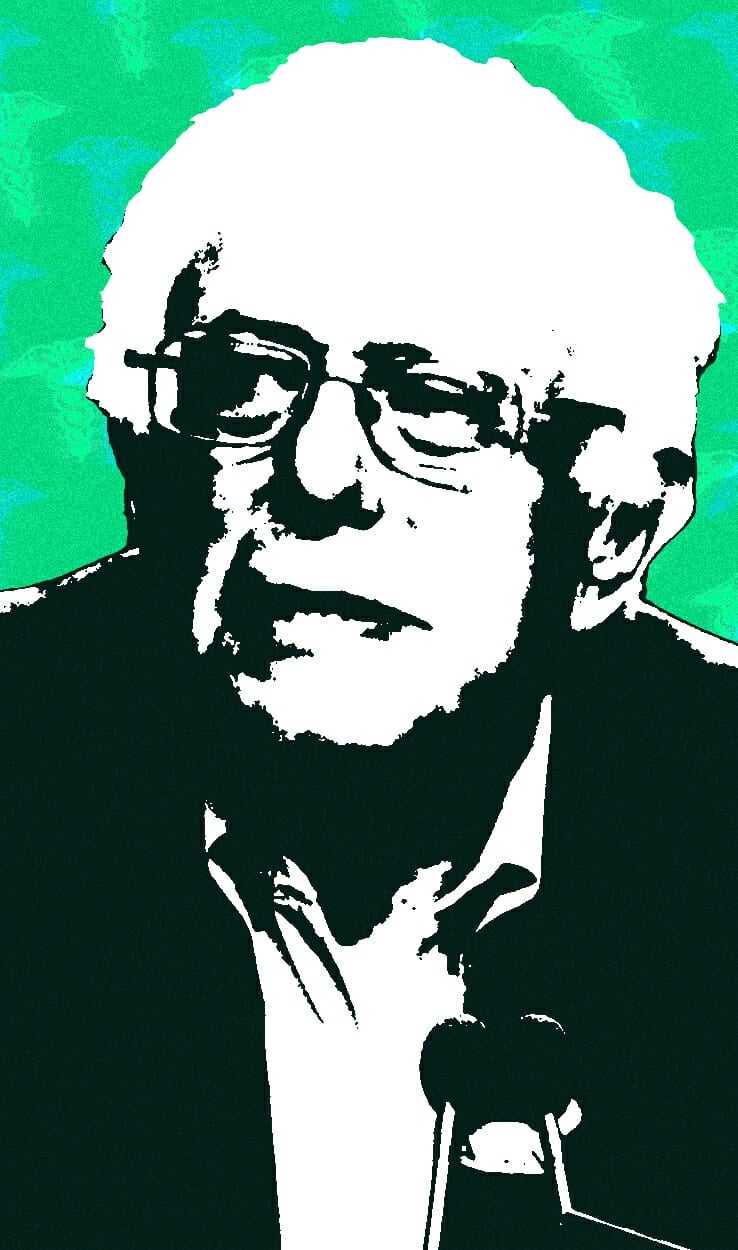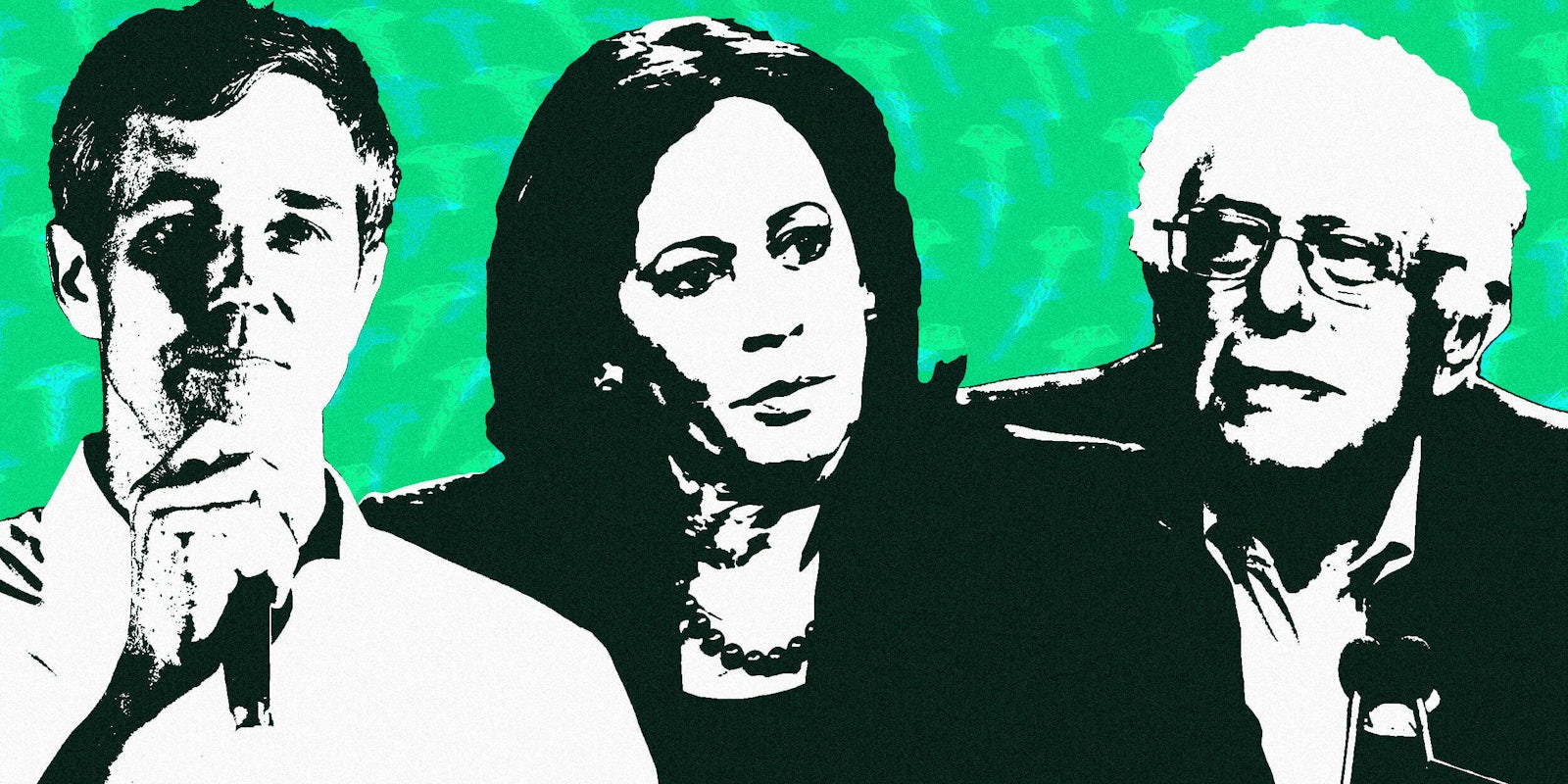“Medicare for All” has been the dominant phrase in the healthcare conversation for 2020 Democratic candidates in the run-up to the 2020 primary. Though the phrase sounds simple, it has proven complicated. While almost every candidate pays at least lip service to Medicare for All, no two candidates hold the same policy position.
Medicare for All advocates support a single, government-run health program with comprehensive, universal coverage that is free at the point of service. This plan would be accompanied by a jobs initiative that would ease the transition from private to government-run industry.
A number of 2020 Democrats who say they support Medicare for All actually prefer different approaches, like the public option or Medicare expansion. By contrast, 2020 candidates who actually want Medicare for All would still likely vote for less ambitious measures to improve the system.
Here’s where the 2020 Democratic candidates stand on healthcare.
2020 Democratic candidates: Where they stand on healthcare
Sen. Bernie Sanders (I-Vt)

Bernie Sanders is the only one of the 2020 Democratic candidates who has been unequivocal in his support of Medicare for All, which means he is probably the only candidate who can reasonably be expected to make Medicare for All a legislative priority if he is elected president.
The bills introduced in the House by Rep. Pramila Jayapal (D-Wash.) and in the Senate by Sanders are the only plans that meet the standard that healthcare advocates have set for defining “Medicare for All.” While other plans provide “access” to “affordable” healthcare, Medicare for All is the only plan that would guarantee universal coverage for every citizen of the United States.
In an USA Today op-ed promoting Medicare for All, Sanders wrote, “Medicare is the most popular, successful, and cost-effective health insurance program in the country. Today, only people 65 and older are eligible for it. Americans shouldn’t have to wait that long to get the high-quality healthcare they need and deserve.”
Sen. Elizabeth Warren (D-Mass.)
While Elizabeth Warren is by far the second-most progressive of the 2020 Democratic candidates, when it comes to healthcare, she lands closer to more moderate candidates like Sen. Cory Booker (D-N.J.) and Sen. Kamala Harris (D-Calif.) than she does to Sanders. For Warren, there are a number of possible paths to universal coverage, and some of them might involve the continued dominance of private insurance companies in a marketplace.
Warren told Bloomberg, “There are multiple bills on the floor of the United States Senate. I’ve signed onto Medicare for All. I’ve signed onto another one that gives an option for buying into Medicaid. There are different ways we can get there. But the key has to be always keep the center of the bull’s-eye in mind. And that is affordable healthcare for every American.”
She doubled down on her position in her recent CNN Town Hall, saying, “When we talk about Medicare for All, there are a lot of different pathways. What we’re all looking for is the lowest-cost way to make sure that everybody gets covered.”
Outside of the Medicare for All debate, Warren has some interesting proposals including plans to control the price of prescription drugs.
Sen. Kamala Harris (D-Calif.)

During her CNN Town Hall, Kamala Harris seemed poised to offer a full-throated endorsement of Medicare for All. Regarding private insurance, she said, “Let’s eliminate all of that. Let’s move on.”
Yet she quickly backtracked on this. The next day, one of Harris’ advisers “signaled [to CNN] that the candidate would also be open to the more moderate health reform plans.”
Harris’ press secretary added, “Medicare for All is the plan that she believes will solve the problem and get all Americans covered. Period. She has co-sponsored other pieces of legislation that she sees as a path to getting us there, but this is the plan she is running on.”
For the New York Times, Harris wrote a candid op-ed about the death of her mother, the American healthcare system, and the need to protect the Affordable Care Act. Analyzing her rhetoric on balance, it seems more likely that she would work on strengthening the ACA if she became president as opposed to a full-on push for Medicare for All.
Sen. Cory Booker (D-N.J.)
Cory Booker is positioning himself as a supporter of Medicare for All. However, when asked if he would get rid of private insurance, Booker dodged the question, saying, “Even countries that have vast access to publicly offered healthcare still have private healthcare, so no.” What Booker didn’t mention here is that countries with government-run healthcare greatly diminish and limit their private health companies, forcing them to work in very specific ways, if at all. Given this position, it’s difficult to tell where Booker actually stands on Medicare for All in comparison to other 2020 Democratic candidates.
Booker’s prior healthcare work has also cast doubt on how serious he is about single-payer healthcare. In 2017, he told Vox that single-payer was just “one of those options that must be considered.” He has also taken big pharmaceutical contributions in the past, and recently voted against a plan that would reduce prescription drug prices.
READ MORE:
- Does Beto O’Rourke’s dog want him to run for president?
- Facebook removes Elizabeth Warren’s ads about breaking up Facebook
- A woman vice president? The 2020 men have some thoughts
Rep. Beto O’Rourke (D-TX)

Beto O’Rourke is one of the few 2020 Democratic candidates in the race who actively opposes Medicare for All.
O’Rourke has come out in favor of the clearly focus-grouped and think-tanked plan which he calls Medicare for America. Essentially, the plan converts Medicare recipients, Medicaid recipients, and those who buy ACA plans into one big Medicare plan.
Though this would likely be a boon for those paying high ACA premiums, it would not fix the problem of massive health costs built up by private insurance companies. By allowing healthcare to exist as a private market, the cost of healthcare will never truly be controlled. Even conservative projections agree that ultimately, Medicare for All would result in net savings.
If there is support for O’Rourke’s proposal, there is little evidence in O’Rourke’s past that he will execute on the issue. He has been wishy-washy on healthcare for a long time. He has claimed that he would write his own Medicare for All plan, then abandoned that idea. He has criticized aspects of Sanders’ proposal, arguing that there should still be premiums and copays. He also outlined a “four-step plan,” which advocated for 50-state Medicaid expansion and a public option before we have single-payer healthcare.
O’Rourke also said that he’s open to “a better way to do this, especially Republicans’ [plans].”
Former Vice President Joe Biden
As of press time, Joe Biden had not declared his candidacy, but the announcement is widely expected in the near future. When he does enter the race, Biden will likely be the most conservative of the 2020 Democratic candidates.
While Biden has not yet released a healthcare plan, all signs indicate that he opposes Medicare for All. Though it is difficult to find quotes where he discusses the viability of universal healthcare, his past policy positions indicate that he will likely support a public option or simply settle for reinforcing the ACA.
To date, Biden’s healthcare efforts have been geared toward supporting the ACA, which he views as the Obama administration’s crowning policy achievement.
Mayor Pete Buttigieg (South Bend, Indiana)
Pete Buttigieg is widely thought to support Medicare for All. The 37-year-old mayor of South Bend, Indiana has received an influx of attention from politically involved liberals looking for an alternative to the major players in the race.
While Buttigieg has sold himself as a progressive, he hasn’t offered anything that other 2020 Democratic candidates like Warren and Sanders don’t already champion. For example, though he claims to support Medicare for All, he has said the private insurance system would remain intact in his vision for American healthcare.
In an interview with ABC, Buttigieg said, “I don’t see why [Medicare for All] requires [the end of private insurance].”
He goes on to suggest that a public option could be part of a private marketplace. So, in reality, he supports the public option, not Medicare for All. Buttigieg’s plan is to expand the age for Medicare qualification and create a public option in the private marketplace. This would likely result in more Americans having access to healthcare and could very well lower costs, but it is not Medicare for All.
READ MORE:
- A guide to the 2020 Democrats’ views on net neutrality
- What are the key differences between Bernie Sanders and Elizabeth Warren?
- Where do 2020 Democratic candidates stand on weed?
Sen. Kirsten Gillibrand (D-NY)
Kirsten Gillibrand’s precise stance on healthcare is a little murky. When her aides spoke to the Washington Post about her support of Medicare for All, they said she had “supported letting anyone in America buy into Medicare since she ran in a conservative House district in 2006.”
That describes both a public option and Medicare for All.
As Gillibrand only officially declared her candidacy recently, we’ll have to hear more from her before it’s clear what exactly her preferred plan entails, and how it stacks up against other 2020 candidates.
Sen. Amy Klobuchar (D-MN)
Amy Klobuchar is one of the only 2020 Democratic candidates who has been openly hostile toward Medicare for All. When asked about the proposal at her CNN Town Hall she said, “It could be a possibility in the future. I’m just at something that will work right now.”
She went on to clarify that her goal would likely be a public option that allows for Medicaid or Medicare buy-in.


